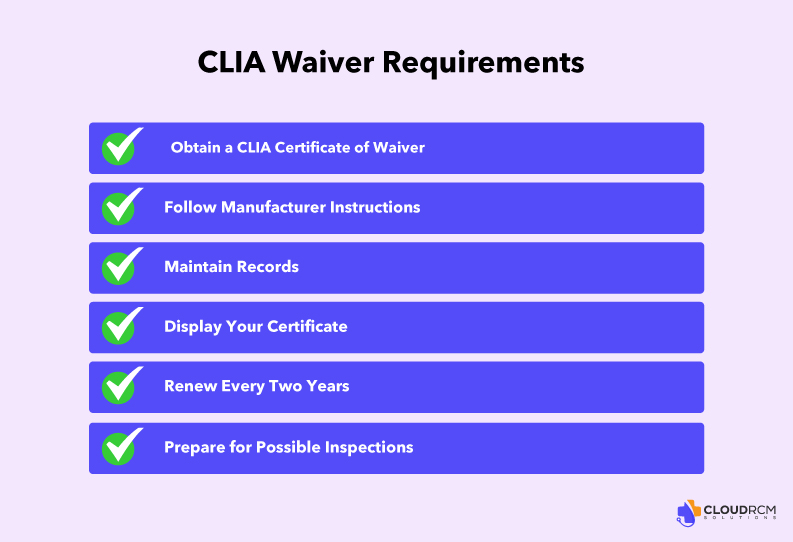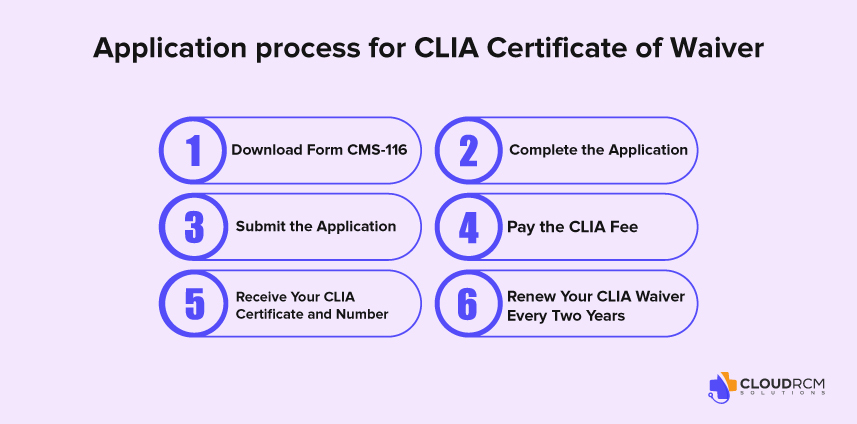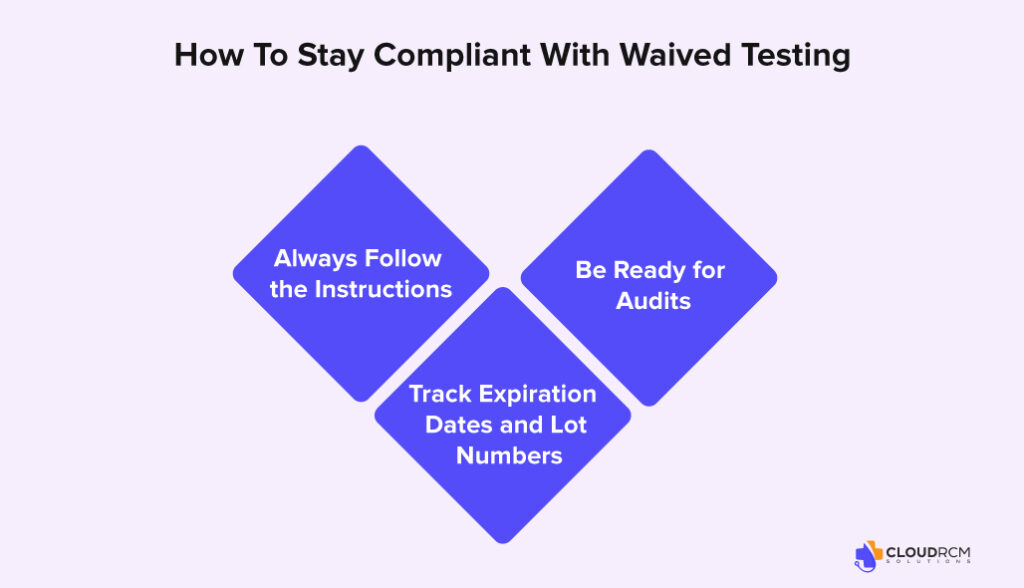In Healthcare, CLIA (Clinical Laboratory Improvement Amendments) waived testing refers to simple, low-risk diagnostic tests like rapid strep, flu, pregnancy, and glucose screenings that can be performed in-office with a Certificate of Waiver. For clinics, nurse practitioners, small practices, and mobile providers, it’s a key tool to deliver faster care, stay compliant, and capture billing opportunities. A 2024 study found that 94% of providers believe point-of-care testing improves patient management, with 92% saying it boosts decision-making confidence (PLOS One, 2024).
In this blog, we’ll cover what CLIA-waived testing is, why it matters for your practice, and how to get started step by step.
What is CLIA-Waived Testing?
If you’re a healthcare provider offering in-office testing, you have likely heard of CLIA-Waived Testing, but what does it mean?
CLIA-waived tests are simple, low-risk lab tests approved by the FDA and classified by CMS as safe for use in non-lab settings. These tests are ideal for clinics, nurse practitioners, small practices, and mobile providers who want to offer quick, in-office diagnostics without the need for a full lab setup.
Common CLIA-waived tests include:
- Rapid strep
- Flu and COVID-19 antigen
- Pregnancy (hCG)
- Urinalysis
Key Requirements for Obtaining a CLIA Waiver

To perform CLIA-waived tests legally, healthcare providers must meet specific requirements set by the Centers for Medicare & Medicaid Services (CMS). These include:
- Obtain a CLIA Certificate of Waiver: Submit Form CMS-116 to your state’s CLIA agency to apply for a certificate that authorizes you to perform waived tests.
- Follow Manufacturer Instructions: Perform all waived tests exactly as the test manufacturer specifies, including proper specimen handling and timing.
- Maintain Records: Keep accurate logs of testing activities, including test kit lot numbers, expiration dates, and test results.
- Display Your Certificate: The CLIA Certificate of Waiver must be posted prominently in your testing area for inspection.
- Renew Every Two Years: CLIA waiver certificates must be renewed biennially to maintain compliance.
- Prepare for Possible Inspections: Even waived testing sites can be audited by federal or state agencies to ensure adherence to regulations.
How to Apply for a CLIA Certificate of Waiver

If you plan to perform CLIA-waived testing in your clinic, practice, or mobile healthcare setup, obtaining a CLIA Certificate of Waiver is an essential first step. This certificate legally authorizes you to conduct low-complexity, waived tests like rapid strep, flu, or COVID-19 in your office.
The application process is straightforward and managed by the Centers for Medicare & Medicaid Services (CMS). To get started, you’ll need to complete and submit CMS Form 116 to your state’s CLIA agency, which is typically part of the state health department.
Download Form CMS-116
Visit the official CMS website and download the latest Form CMS-116 (Application for Certification of Waiver). This form is updated regularly, so always use the current version.
Complete the Application
Fill out your facility’s details, including name, address, National Provider Identifier (NPI), and Tax Identification Number (TIN).
In Section I, select “Certificate of Waiver” as the certificate type. List all the waived tests you intend to perform in your practice. This ensures your certification covers all necessary tests.
Submit the Application
Mail the completed form to your state’s CLIA agency or regional CMS office. The mailing address can be found in the form instructions or on your state health department’s website.
Pay the CLIA Fee
After your application is processed, you will receive an invoice for the annual CLIA fee. For most providers, this fee is around $180, but it can vary by state.
Receive Your CLIA Certificate and Number
Once approved, CMS will issue your CLIA Certificate of Waiver along with a unique CLIA number. Keep this certificate visible in your testing area to show compliance during inspections or audits.
Renew Your CLIA Waiver Every Two Years
The certificate is valid for two years. CMS will send a renewal notice prior to expiration. Be sure to submit your renewal on time to avoid any interruptions in your ability to perform waived tests.
Offering CLIA-waived testing isn’t just about convenience for patients; it can also be a meaningful source of revenue for your practice when billed correctly. Whether you’re a solo NP, a primary care clinic, or a mobile provider, understanding how to code and bill for waived tests can make a big difference to your bottom line.
CPT Codes and the QW Modifier
Most CLIA-waived tests have their own CPT or HCPCS billing codes, and when billing Medicare, you’ll often need to include the QW modifier to indicate that the test was performed under a CLIA Certificate of Waiver. This modifier is essential for reimbursement under Medicare.
Here are a few common examples:
- 87804 – Influenza test (requires QW)
- 87811 – COVID-19 antigen test (requires QW)
- 81002 – Urinalysis, non-automated (does not require QW)
- 81025 – Urine pregnancy test (does not require QW)
- 82962 – Glucose test by blood (does not require QW)
Make sure your billing team checks CMS updates regularly, as new waived tests and code changes are announced annually. For example, CMS released a list of new waived tests effective January 1, 2024 (CMS MLN Matters MM13858).
Payers and Reimbursement Potential
Medicare, Medicaid, and most commercial payers cover a wide range of CLIA-waived tests, provided they’re medically necessary and properly documented. Reimbursement rates vary, but many tests are reimbursed at $15 to $35 each. That might sound modest, but the impact can add up over time.
Revenue Example:
Let’s say your practice performs just 10 waived tests per week, at an average reimbursement of $20 per test:
- $20 x 10 tests = $200 per week
- Over 52 weeks, that’s $10,400 per year
ROI and Practice Growth
According to a 2024 market analysis from Grand View Research, the U.S. point-of-care testing market was valued at approximately $47.8 billion and continues to grow, especially in primary care and outpatient settings. The ability to offer in-house testing improves patient satisfaction and supports better clinical decision-making, while helping practices stay financially healthy.
Staying Compliant with Waived Testing: What to Watch For

CLIA-waived tests are simple to perform, but that doesn’t mean the rules are. Even small practices can be audited, and mistakes can lead to penalties or invalid test results. Here’s what you need to keep an eye on:
Always Follow the Instructions
Use each test exactly as the manufacturer directs. That includes correct timing, storage, and specimen collection. Any deviation can compromise accuracy and lead to noncompliance.
Track Expiration Dates and Lot Numbers
Log every test kit’s lot number and expiration date, especially when recording positive or abnormal results. Discard expired kits right away to avoid liability and compliance issues.
Be Ready for Audits
Yes, even waived labs can be inspected. Keep your CLIA certificate posted and maintain records of training, test logs, and kit documentation. A simple binder or digital file works well for this.
State-Specific CLIA Requirements: What to Know Before You Apply
While CLIA is a federal program, some states have their own additional requirements when it comes to laboratory testing and certification. If you’re in one of these states, it’s essential to understand the local rules before you begin offering waived tests.
- California (CA): Requires both a federal CLIA certificate and a state-issued laboratory license from the California Department of Public Health (CDPH), even for waived testing. You must also designate a Laboratory Director who meets specific qualifications.
- New York (NY): Operates independently under its own Clinical Laboratory Evaluation Program (CLEP). Most waived testing still requires state approval, and labs must comply with New York’s unique quality and personnel standards.
- Washington (WA): Requires providers to register with the state’s Medical Test Site (MTS) Program. Inspections may be more frequent, and additional reporting may be required for certain types of testing.
Should You Consider Moderate Complexity Testing?
CLIA-waived tests are a great starting point; they’re quick, low-cost, and easy to implement. But as your patient volume grows or your clinical needs expand, you might start wondering whether moderate complexity testing is the next step.
These tests offer a broader range of diagnostics and more in-depth results, but they come with higher compliance and staffing requirements. Here’s a quick comparison:
| Feature | Waived Testing | Moderate Complexity Testing |
| Certification Required | CLIA Certificate of Waiver | CLIA Certificate of Compliance or Accreditation |
| Staff Requirements | No formal lab training required | Must meet CLIA personnel standards |
| Oversight | Minimal | Subject to regular inspections |
| Common Tests | Rapid strep, flu, COVID, urinalysis | CBCs, cholesterol panels, cultures |
| Setup Cost | Low | Moderate to high |
Final Thought
CLIA-waived testing is a powerful tool for healthcare providers looking to deliver faster, more efficient care while boosting practice revenue. By understanding the application process, billing requirements, and compliance essentials, small practices, nurse practitioners, and mobile providers can confidently incorporate these tests into their workflows. With growing demand and reimbursement opportunities, now is the perfect time to explore how waived testing can support your practice’s growth and patient satisfaction.
How CloudRCM Supports Your In-Office Testing Success
At CloudRCM, we help healthcare providers grow their setup and billing of in-office testing. From CLIA waiver applications and credentialing support to full revenue cycle management (RCM), our team ensures you meet compliance requirements and get paid accurately for every test performed. Whether you’re launching a new lab or adding waived testing to your practice, we make the process simple.
Contact us today for a free consultation or grab our CLIA Billing Checklist to get started.
FAQs:
What types of tests qualify as CLIA-waived?
Simple, low-risk tests like rapid strep, flu, COVID-19 antigen, pregnancy, and urinalysis are typically CLIA-waived.
How often do I need to renew my CLIA Certificate of Waiver?
Renewals are required every two years to maintain compliance and continue performing waived tests.
Can I bill Medicare for CLIA-waived tests?
Yes, with the correct CPT codes and the QW modifier to show the test was done under a CLIA waiver.
Are waived labs subject to inspections?
Yes, even waived labs can be audited or inspected to ensure compliance with CLIA regulations.
Do all states have the same CLIA requirements?
No, some states like California, New York, and Washington have additional rules and licensing beyond federal CLIA requirements.
What types of tests qualify as CLIA-waived?
Simple, low-risk tests like rapid strep, flu, COVID-19 antigen, pregnancy, and urinalysis are typically CLIA-waived.
How often do I need to renew my CLIA Certificate of Waiver?
Renewals are required every two years to maintain compliance and continue performing waived tests.
Can I bill Medicare for CLIA-waived tests?
Yes, with the correct CPT codes and the QW modifier to show the test was done under a CLIA waiver.
Are waived labs subject to inspections?
Yes, even waived labs can be audited or inspected to ensure compliance with CLIA regulations.
Do all states have the same CLIA requirements?
No, some states like California, New York, and Washington have additional rules and licensing beyond federal CLIA requirements.

 Medical Billing
Medical Billing Medical Coding
Medical Coding Medical Audit
Medical Audit Provider Credentialing
Provider Credentialing Denial Management
Denial Management A/R Follow-up
A/R Follow-up Private Practice
Private Practice Patient Help Desk
Patient Help Desk Customized Reporting
Customized Reporting Out-of-Network Billing
Out-of-Network Billing Internal Medicine
Internal Medicine Pediatrics
Pediatrics Radiology
Radiology Surgery
Surgery Emergency Medicine
Emergency Medicine Anesthesiology
Anesthesiology Cardiology
Cardiology Orthopedic
Orthopedic Psychiatry
Psychiatry Dentistry
Dentistry OB-GYN
OB-GYN Family Medicine
Family Medicine


